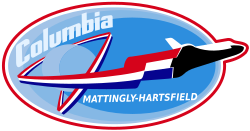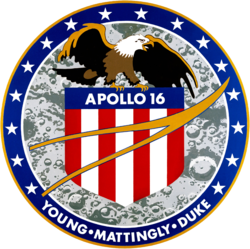Ken Mattingly
| Ken Mattingly | |
|---|---|
 | |
| Astronaut | |
| Statsborger | USA |
| Nationalitet | Amerikaner |
| Født | 17. marts 1936 Chicago, Illinois, USA |
| Død | 31. oktober 2023 (87 år) Arlington County, Virginia, USA |
Andet arbejde | Testpilot |
| Uddannelses- sted | U.S. Air Force Test Pilot School Auburn University Miami Edison High School |
| Udvælgelse | NASA Årgang 1966 |
| Mission(er) | Apollo 16 • STS-4 • STS-51-C |
| Missionsemblemer | |
Ken Mattingly (født 17. marts 1936 i Chicago, død 31. oktober 2023[1]) var en amerikansk astronaut, der var i rummet tre gange.
Han skulle have været med ud i rummet med Apollo 13, men blev inden missionen skiftet ud med John Swigert, fordi han muligvis var syg.
Referencer
- ^ "NASA Administrator Remembers Apollo Astronaut Thomas K. Mattingly II". 2. november 2023.
Eksterne henvisninger
| Spire Denne biografi om en amerikaner er en spire som bør udbygges. Du er velkommen til at hjælpe Wikipedia ved at udvide den. |
|
Medier brugt på denne side
The crew insignia for STS Flight 51-C includes the names of its five crewmembers. The STS 51-C mission marked the third trip of the Space Shuttle Discovery into space. It was the first Space Shuttle mission totally dedicated to the Department of Defense. The U. S. Air Force Inertial Upper Stage Booster Rocket was successfully deployed. Due to the nature of the mission, few additional details of the flight were made available. Landing was made at the Kennedy Space Center, FL on January 27 at 4:23 PM EST. Mission duration was three days, one hour and 33 minutes.
Emblem of Nasa's STS-4 mission.
Apollo 16 mission logo
The Apollo 16 crew patch is dominated by an eagle perched atop a red, white and blue shield a superimposed on a lunar scene, surrounded by a blue circle of 16 stars with the crew's surnames completing the bottom are of the circle. Across the face of the shield is a gold symbol of flight outlined in blue, similar to that on the National Aeronautics and Space Administration (NASA) agency seal and insignia. The design was created by NASA artist Barbara A Matelski[1][2] from ideas submitted by the three crew members: astronauts John W. Young, commander; Thomas K. Mattingly II, command module pilot; and Charles M. Duke Jr., lunar module pilot.





